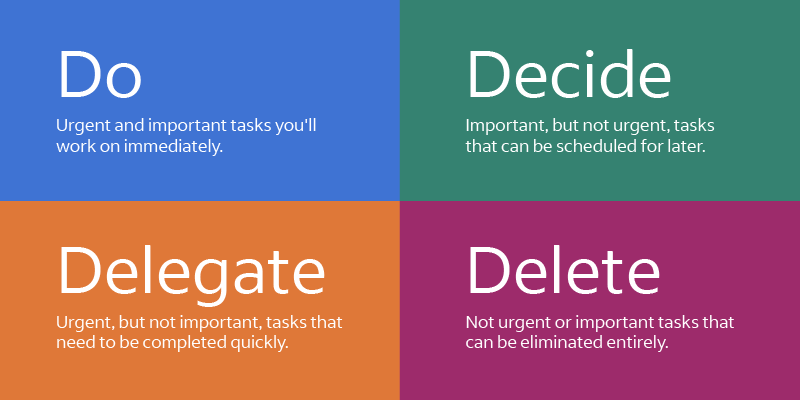As you advance in your career you'll find you are increasingly "in demand", both internally and externally. If left unchecked this work will consume your entire week; it's important to prioritize accordingly. The Eisenhower Matrix is a system by which you can bucket different kinds of work so that you can focus on only the highest impact items.
The Eisenhower Matrix was developed by Dwight D. Eisenhower, 34th President of the United States, during his time as a General in the U.S. Army. It ranks work on two dimensions: Urgency and Importance. Urgent work requires immediate attention and is frequently time-sensitive while Important work is work that helps you achieve your long-term goals.

Let's look at some examples (these are Engineering Manager centric).
Example #1: Urgent and Important
Work: There is a Leadership meeting at the end of the week. Your Director has asked you to put together a Presentation on the new Login capabilities and how they fit into your Roadmap.
Triage: This is Urgent and Important work. You can't have the meeting without the Presentation materials and it's strategically important that Leadership be apprised of your Roadmap progress. Make this a priority for this week.
Example #2: Urgent, but Not Important
Work: All tickets in your current Sprint need updating in time for your next Planning meeting.
Triage: This is Urgent, but not Important work. That is, this work needs to be completed this week but is not strategically important to your goals. Delegate this work to someone else (Engineer, Project Manager, Scrum Master, etc.).
Example #3: Important, but Not Urgent
Work: You and your Director are designing a new organizational structure you plan on rolling out 2 quarters from now.
Triage: This is Important, but not Urgent work. This work is far enough in the future that it's not Urgent, but it is strategically important as it reorganizes the team so that it's more efficient and better aligned with business objectives. This work can be scheduled for later.
Example #4: Not Urgent, Not Important
Work: You've had an idea for a utility script that auto-archives email more than 20 days old and want to implement this to save you time.
Triage: This work is not Urgent, and not Important. It is tempting to think that these little utilities will save you "hours of time" and while they might improve your workflows in marginal ways, the biggest benefit to you for time saving is Ruthless Prioritization™. Drop this work from you Todo list immediately.
The following 4 step process conducted at the beginning of every week will help you identity the most critical work you should be working on.
1. Classify your work
At the beginning of each week triage your list of Todo's and classify them according to the Eisenhower Matrix. Don't forget to classify new work as it surfaces.
2. Block off Time for Urgent/Important Work
Block off an appropriate amount of time on your calendar to complete the Urgent and Important work. These are your highest priority items that will have the greatest impact.
For all remaining long-term work, identify the deadlines and how much work is required. If there is "budget" left in your calendar, block off time to work through some of these items.
3. Delegate, Delegate, Delegate
Any Urgent but Not Important work should be delegated to trustworthy persons. Provide the requisite context, communicate your ask and expectations, and follow up accordingly based on the urgency of the work.
Common work that is straightforward to delegate as a Manager includes: interview scheduling, scrum duties and ceremonies, meetings where no major decisions need to be made, data collection, some types of status updates, and deep technical consultations, and some types of administrative work.
Delegation has a side benefit that's worth mentioning: administrative training. Try delegating admin work to Software Engineers reaching for a Senior title or folks curious about Engineering Management. This is a great way for them to become familiar with the expectations of these more mature roles.
5. Drop any Not Urgent/Not Important work
Any remaining work that is Not Urgent and Not Important should be removed. Drop this work until it resurfaces again.
The Eisenhower Matrix is a powerful tool for prioritizing work and identifying high impact opportunities. You won't be able triage all your work perfectly every week but having a framework you can quickly apply to your Todo list drastically simplifies the prioritization process and makes it easier to identity high impact work that can dramatically accelerate your career.
Interested in learning more ways you can supercharge your performance? Check out my Coaching services.